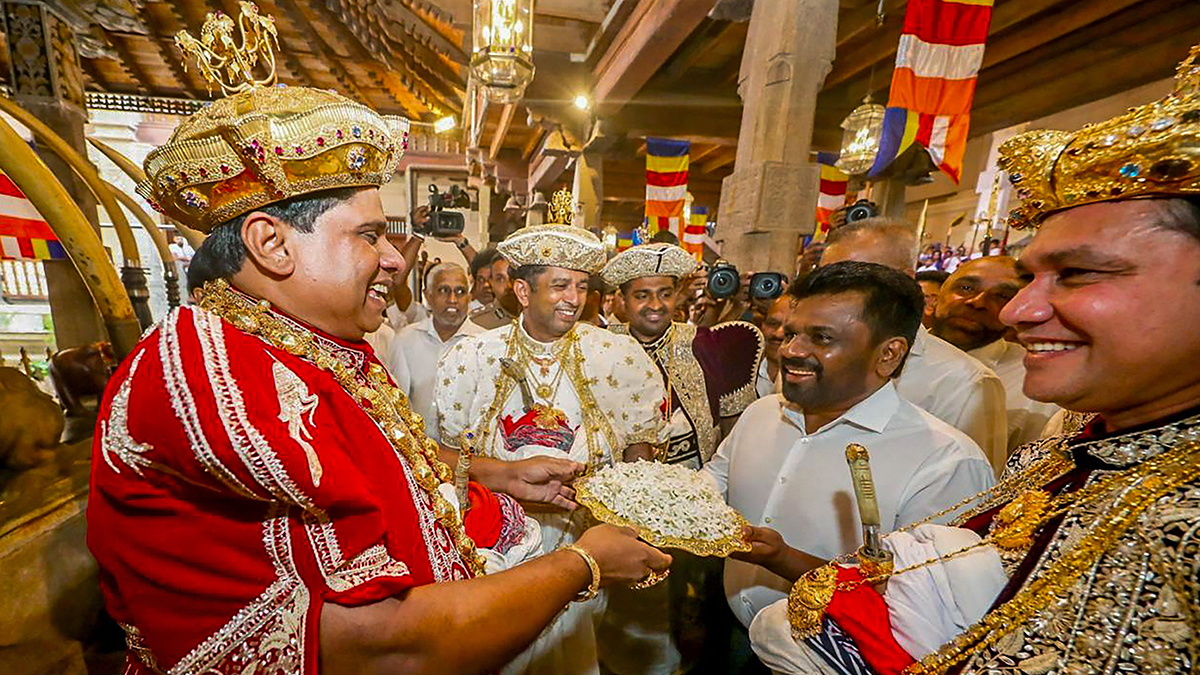Two weeks before the presidential election in Sri Lanka, members of the island nation’s business community gathered at the Monarch Imperial hotel in Colombo to listen to Anura Kumara Dissanayake, who was the surprise frontrunner. The businessmen were probably concerned about a Marxist leader taking over as president. Anura spoke for about an hour, trying to assuage their concerns and explaining his plans for the economy.
As he was leaving, this correspondent tried to ask him a few questions. “We will win,” he said. But he was in no mood to talk further. “Please share your contact number. I will call you.” He kept his word.
A fortnight later, when the votes were counted, Anura won a clear mandate, beating key challengers like Sajith Premadasa of the Samagi Jana Balawegaya and Ranil Wickremesinghe of the United National Party. He was sworn in on September 23.
Sri Lanka’s new generation voters expect Anura to combine his hardline Marxist principles with pragmatic reforms. “The people wanted a change in the political and the economic systems. We want to make that wish a reality,” said Anil Jayantha, a prominent member of Anura’s political coalition. “Our leader has the education, competence, skills and vision. All these years, the people’s mandate was used to serve private interests and the elites. He will use it to uphold public interest.”
Anura leads the National People’s Power (NPP), a coalition of leftist political parties and socialist groups. He also heads the Janatha Vimukthi Peramuna (JVP), the leading party in the coalition. Born on November 24, 1968, in Anuradhapura district to a daily-wage worker and a homemaker, Anura was a rebel during his student days. The murder of his first cousin, a JVP member, and the torching of his house after the JVP insurrection in the late 1980s, furthered his resolve to become active in politics. He was appointed to the central working committee of the JVP in 1995, and three years later, he made it to the party’s political bureau. When Chandrika Kumaratunga’s Sri Lanka Freedom Party formed the government in the early 2000s, he was part of it as agriculture minister.
However, it is not going to be an easy road for Anura as president, as the people impatiently wait for action against corruption and a solution to the economic mess. He was forthcoming in his first social media message after taking charge. “I’m not a magician.... I have abilities and shortcomings. My first task is to make use of people’s talents and know-how and make better decisions to lead this country,” he said.
There is also a sense of uncertainty as the JVP is completely inexperienced in governance and administration. “His coalition has minimal experience running a complicated state like Sri Lanka. They will also struggle to implement their many promises in a challenging economic environment and may struggle to achieve a majority in the parliament. This election is sure to raise eyebrows in many foreign capitals,” tweeted Erik Solheim, former Norwegian peace ambassador to Sri Lanka, who was a key mediator between the Sri Lankan government and the LTTE.
The JVP’s troubled past and its militant character continue to haunt many people. “They might be more pragmatic and have a mainstream approach now. But within their ranks and their regimented culture, there is no democracy,” said a senior member of the Sri Lanka Podujana Peramuna, the political party of the Rajapaksas.
Anura’s work will be hampered if the JVP and the NPP fail to win enough seats to run the parliament. On September 24, he dissolved the 225-member house in which his coalition had just four MPs, including himself. Fresh elections will be held on November 14, almost a year ahead of schedule, and the new session will start on November 21. Anura appointed JVP MP and former academic Harini Amarasuriya as the new prime minister, who would share ministerial responsibilities with two other JVP parliament members.
The JVP will face a major challenge if Premadasa’s SJB and Wickremesinghe’s UNP join hands. Sources say Wickremesinghe has decided not to contest the parliament elections and would act as an adviser to the party, while UNP deputy leader Ruwan Wijewardene wants the opposition parties to form a grand alliance against the NPP.
On the foreign policy front, Anura’s victory could alter the existing geopolitical realities in the region, as he is considered close to China. His idea of renegotiating the IMF economic programme and his threat about cancelling the Adani Group’s wind power project point towards a radical reorientation of the existing policies.
From its inception, the JVP has been anti-India. Its insurrection in the late 1980s came against the backdrop of the possibility of Tamil autonomy in the Northern and Eastern Provinces and the presence of the Indian Peace Keeping Force. The party once denounced hill country Tamils as a “fifth column instrument of Indian expansionism”. Anura has been opposed to Sri Lanka’s Comprehensive Economic Partnership Agreement with India, which opened up possibilities for greater trade and investment between the two countries. He has also opposed all attempts to return the Katchatheevu island to India.
However, in his exclusive interview with THE WEEK ahead of the election, Anura was positive about engaging with India. “Our approach to India will reflect its close proximity and significant role in geopolitics. We will ensure that our sea, land and air space are not used in ways that threaten India,” he said. “We are committed to maintaining our sovereignty and will not become subordinate to any power in this geopolitical race.”


